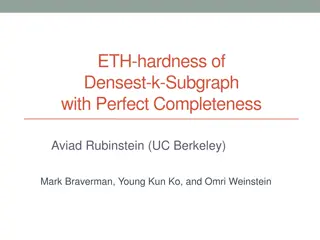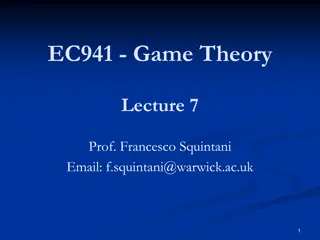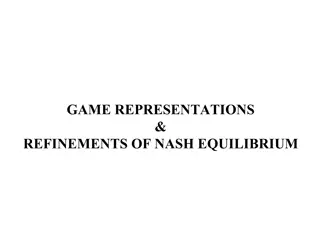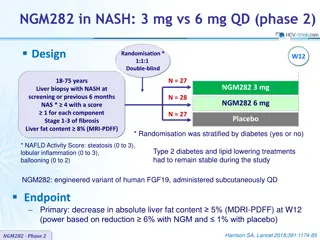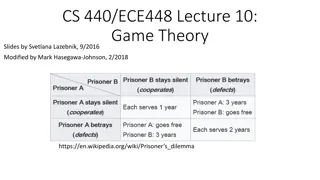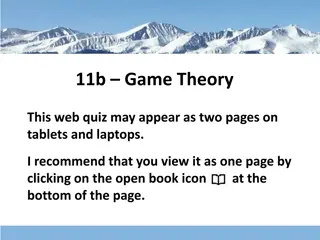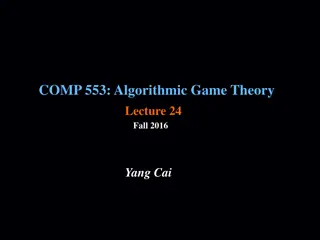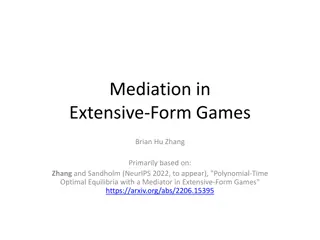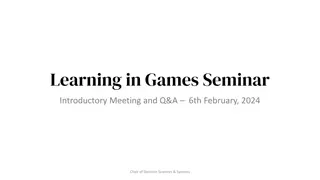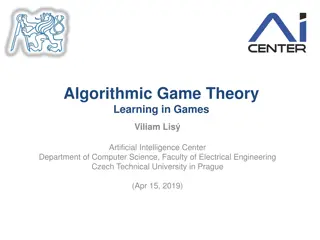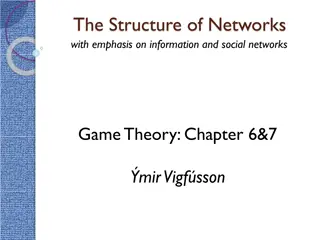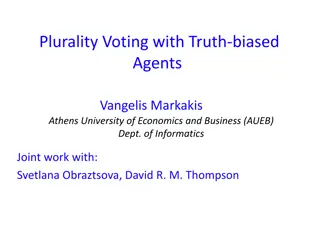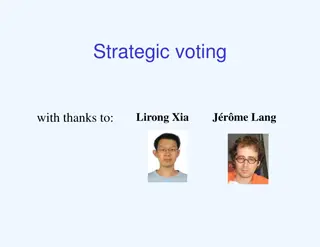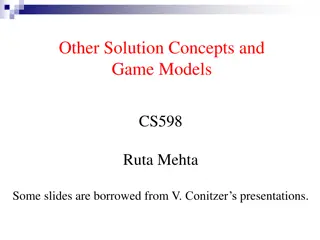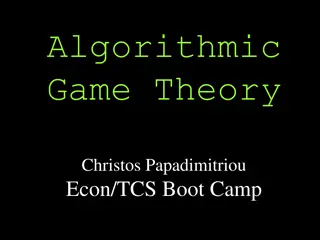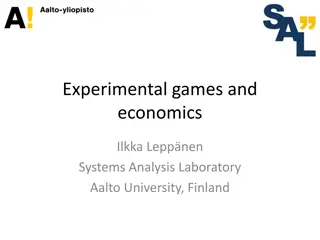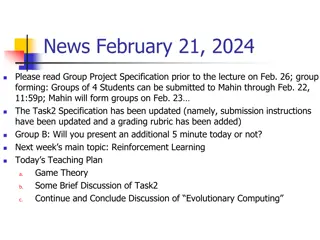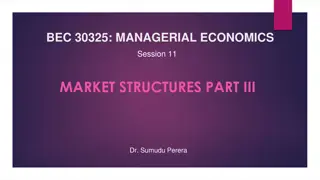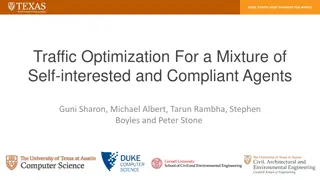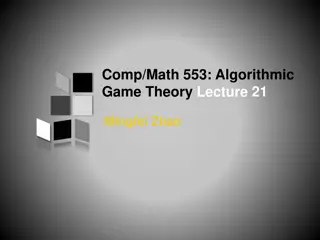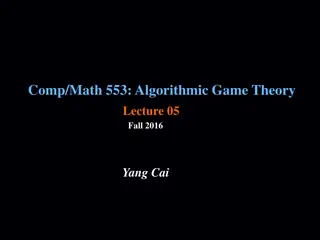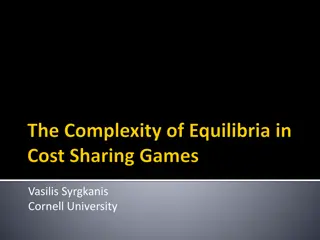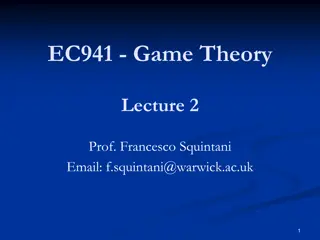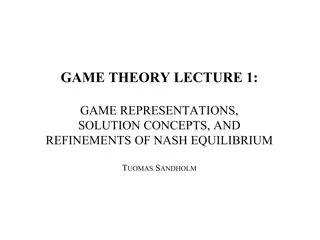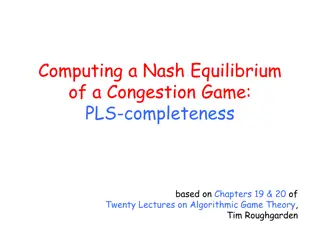Neonatal Data Collection and Utilization in Quality Care
Dive into the world of neonatal data with Catherine Nash, where the focus lies on the importance of collecting and utilizing data effectively to enhance care standards for babies and families. Discover how data systems like BadgerNet play a vital role in monitoring care, diagnosing treatments, measu
0 views • 7 slides
Overview of Cooperative Game Theory and Bargaining Solutions
Cooperative game theory explores situations where players have mutual benefits in cooperating. The focus is on bargaining solutions to reach agreements despite conflicting interests. Key concepts include Nash Bargaining Solution, Kalai-Smorodinsky Bargaining Solution, and Rubinstein Bargaining Proce
2 views • 24 slides
Women and Gender in the Civil Rights Movement
Women played crucial roles in the Civil Rights Movement, with leaders like Rosa Parks, Ella Baker, Diane Nash, and Fannie Lou Hamer making significant contributions. Behind the scenes, many women undertook activities like organizing and grassroots activism. This resource explores the impact of women
0 views • 10 slides
Recent Applications of Quasi-Poly Time Hardness in Densest k-Subgraph
Recent applications of the Birthday Repetition technique have demonstrated the quasi-polynomial time hardness in various computational problems, including AM with k provers, Dense CSPs, Free games, and Nash equilibria. These applications also explore the potential implications in signaling theory an
0 views • 18 slides
History of NASH - Setting Standards and Certification in Homeopathy
NASH, founded in 1990, aimed to set competency standards, certify homeopaths, advocate for legality, and gain recognition in the homeopathic community. They emphasized the ability to solve cases effectively, without requiring an exam. Collaborating with the CHC, NASH worked towards higher standards
0 views • 23 slides
Game Theory Lecture 7: Repeated Games and Equilibria
Exploring the concept of repeated games in game theory, this lecture covers infinitely repeated games, Nash and subgame-perfect equilibria, strategies, a Grim Trigger Strategy in the Prisoner's Dilemma, and automaton representation. Understanding how interactions evolve over time offers insights int
0 views • 45 slides
Game Representations & Refinements of Nash Equilibrium
Game representations, such as normal form and extensive form, along with refinements of Nash Equilibrium, are important concepts in game theory. Various games like Rock-paper-scissors are analyzed in terms of sequential and simultaneous moves, as well as imperfect information extensive form games wi
0 views • 22 slides
NGM282 in NASH: Phase 2 Study on Liver Fat Reduction and Histology Changes
A phase 2 study on NGM282 in NASH patients showed a significant decrease in liver fat content, meeting the primary endpoint. Exploratory findings also indicated potential improvements in liver histology. The treatment involved NGM282 at 3 mg QD, with additional rosuvastatin if needed. Promising resu
1 views • 11 slides
NGM282 in NASH Phase 2: 3 mg vs 6 mg QD Randomised Trial
This Phase 2 clinical trial compares the efficacy of NGM282 (3 mg vs 6 mg) versus placebo in patients with NASH. The primary endpoint is a 5% reduction in liver fat content at 12 weeks. Randomisation was stratified by diabetes status, and stable Type 2 diabetes and lipid-lowering treatments were mai
1 views • 6 slides
Game Theory: Applications and Concepts
Game theory delves into systems of interacting agents where outcomes depend on each agent's actions. Explored in various fields, it helps in agent design and mechanism design for optimal strategies and rule-setting. Topics covered include Nash equilibrium, coordination games, anti-coordination games
1 views • 39 slides
Pharmacotherapy for Non-Alcoholic Fatty Liver Disease: An Updated Review by Anita Eftekharzadeh
This comprehensive review discusses the pharmacotherapy options for Non-Alcoholic Fatty Liver Disease (NAFLD), covering topics such as sub-classification of NAFLD, proposed risk stratification, non-invasive measures for assessing liver fibrosis, and the NAFLD Activity Score (NAS). Anita Eftekharzade
1 views • 44 slides
Oligopoly and Game Theory in Economics
Explore the concepts of game theory and oligopoly in economics, including strategic behavior, dominant strategy, self-enforcing agreements, Nash equilibrium, and more. Learn how decision-making in oligopolies is influenced by the actions of competitors, and why collusion agreements may be disrupted
0 views • 28 slides
Brouwer's Fixed Point Theorem and Nash's Proof in Algorithmic Game Theory
Explore the foundational theorems of Brouwer and Nash in Algorithmic Game Theory. Dive into Brouwer's Fixed Point Theorem, showcasing the existence of fixed points in continuous functions. Delve into Nash's Proof, unveiling the Nash equilibrium in game theory. Discover visualizations and constructio
1 views • 23 slides
Mediation in Extensive-Form Games: Polynomial-Time Optimal Equilibria
This content discusses the concept of mediation in extensive-form games based on the work of Zhang and Sandholm. It explores correlated equilibria in normal-form games and the role of a mediator in achieving Nash equilibrium among players. Various game scenarios, strategies, and equilibrium concepts
0 views • 46 slides
The Career and College Promise Program at Nash Community College
Discover the Career and College Promise Program offered at Nash Community College, providing tuition-free college classes to eligible high school students. Gain insights into the academic and financial benefits of the program, eligibility criteria, and the rich history and offerings of Nash Communit
1 views • 24 slides
Game Theory: Strategies, Payoffs, and Equilibriums
Explore the world of game theory through concepts like dominant strategies, Nash equilibrium, game trees, and matrix forms. Delve into examples involving decision-making scenarios among players to grasp the intricate dynamics of strategic interactions.
1 views • 26 slides
Learning in Games Seminar
Explore the intersection of Game Theory and Machine Learning in the context of Learning in Games. Discover how decision-makers adapt strategies to maximize their utility, with emphasis on Multi-Agent Learning. Topics include AI for Board Games, Equilibrium Computation in Auctions, and various soluti
1 views • 11 slides
Algorithmic Game Theory Learning in Games by Viliam Lis
The content discusses the concept of algorithmic game theory learning in games, covering topics such as online learning, prediction, best response dynamics, and convergence to Nash equilibrium. It explores how simple learning agents achieve equilibrium outcomes and the application of algorithms in v
1 views • 23 slides
Mixed Strategies in Game Theory
Explore the concept of mixed strategies in game theory through examples and insights on Nash equilibrium. Discover how players randomize their actions to create uncertainty and strategic advantages. Learn how mixed equilibria are applied in real-world scenarios and how they contribute to the stabili
0 views • 46 slides
Plurality Voting with Truth-biased Agents
Investigating game-theoretic approaches in voting, this research delves into the complexities of plurality voting with truth-biased agents, exploring Nash equilibria, strategic aspects, and undesirable outcomes. The study aims to provide a more realistic model of voting behavior and decision-making
0 views • 32 slides
Social Welfare Maximization and Truthful Mechanisms in Curricula Review
Explore the concept of social welfare maximization through the lens of truthful mechanisms in curriculum review. Understand the VCG mechanism, Nash equilibrium, and the formal definition of maximizing social welfare. Learn about the importance of designing mechanisms that promote honesty and optimiz
0 views • 36 slides
Strategic Voting in Sequential Voting Games
Strategic voting in sequential voting games involves voters strategically casting their votes based on information about previous voters' preferences. Various voting rules like Plurality Rule and Borda Rule can result in different outcomes, and the concept of Nash equilibrium is explored. The settin
1 views • 32 slides
Game Theory Concepts and Models in Strategic Decision-Making
Exploring various solution concepts and game models in the realm of game theory, this presentation delves into topics such as Nash equilibrium, dominance, dominant strategy equilibrium, mixed strategies, and iterated dominance. It discusses how players decide on particular equilibria, possible solut
0 views • 39 slides
Evolution of Algorithmic Game Theory in Computer Science
The evolution of Algorithmic Game Theory (AGT) in the realm of Computer Science showcases the intersection of economics and theoretical computation. Before 1995, notable researchers like von Neumann and Megiddo laid the foundation for AGT. Concepts such as computation as a game, bounded rationality,
0 views • 62 slides
Insights into Experimental Games and Economics
Explore the world of experimental games and economics, from the history of market experiments to the concept of equilibrium in game theory. Understand the purpose of experiments, how theories are validated, and the relevance of strategic situations in game analysis. Delve into the Nash equilibrium a
0 views • 27 slides
Game Abstraction and Equilibrium
Extensive-Form Game Abstraction with Bounds delves into the complexities of game abstraction, exploring theoretical guarantees, algorithmic challenges, and equilibrium-finding processes. The difficulty of game abstraction is examined, highlighting issues such as pathologies and the struggle to optim
0 views • 22 slides
Unraveling the Complexities of Hex Game Encoding Paradigms
Hex, a strategic two-player game invented by John Nash and Piet Hein, poses intriguing challenges for mathematicians and computer scientists. This article delves into different paradigms for encoding Hex game rules, exploring the performance of each. From basic observations to advanced approaches li
0 views • 20 slides
Game Theory: Understanding Strategies and Cooperation in Decision-Making
Explore the world of game theory, a study of conflict and cooperation among decision-makers. Learn about Nash equilibrium, optimal strategies, and its applications in various fields such as economics, politics, AI, and wildlife conservation.
1 views • 34 slides
Monopolistic Competition and Game Theory in Managerial Economics
Exploring the concepts of monopolistic competition, market structures, equilibrium conditions, and strategic behavior in managerial economics. The content covers aspects like differentiated products, pricing strategies, game theory applications, and optimal decision-making within competitive framewo
0 views • 45 slides
Traffic Optimization for Self-interested and Compliant Agents
In this study, Guni Sharon, Michael Albert, Tarun Rambha, Stephen Boyles, and Peter Stone explore traffic optimization for a mixture of self-interested and compliant agents. The research delves into routing flows of agents across networks and analyzes equilibrium scenarios. The motivation behind the
0 views • 20 slides
Traffic Routing and Game Theory in Network Design
Explore the intersection of traffic routing and game theory in network design scenarios. Delve into concepts like Atomic Congestion Games, Potential Function, Price of Anarchy and Stability, Nash Equilibrium, Braess's Paradox, and the pursuit of Pure Strategy Nash Equilibriums in traffic routing gam
0 views • 16 slides
Algorithmic Game Theory: Nash Equilibria Algorithms
This content delves into the computational complexity of finding Nash equilibria in games, exploring support enumeration algorithms and their implications for two-player and n-player games. It covers the concepts, theorems, and algorithms involved in Nash equilibrium computation, highlighting the ch
0 views • 22 slides
Cenicriviroc in NASH Phase 2b Study
Phase 2b study evaluating cenicriviroc in NASH patients, focusing on hepatic histologic improvement, fibrosis, and metabolic factors. The study design, randomization, baseline characteristics, primary and key secondary endpoints, and efficacy outcomes are discussed.
0 views • 10 slides
Phase 2b Study on Cenicriviroc in NASH - CENTAUR Study
Randomized double-blind study on efficacy of Cenicriviroc in NASH patients with specific criteria including hepatic histologic improvement and no worsening of fibrosis. The primary endpoint at Year 1 focused on NAS improvement, with key secondary endpoints including fibrosis and steato-hepatitis imp
0 views • 6 slides
Efficient Computation of Pure Nash Equilibrium in Game Theory
This content discusses the computational complexity of finding Pure Nash Equilibria in game theory, focusing on different scenarios and algorithms. It explores the challenges and solutions related to computing Pure Nash Equilibria efficiently in various types of games.
0 views • 33 slides
Understanding Game Theory: Mixed Strategies & Nash Equilibrium
Explore the concept of mixed strategies in game theory, including Nash Equilibrium, Rationalizability, and Correlated Equilibrium. Learn how players use randomizing devices to make strategic decisions, and delve into examples like Matching Pennies to understand the principles behind mixed strategies
0 views • 42 slides
Understanding Game Theory: Representations and Equilibria
Explore the complexities of game theory, including different game representations, solution concepts like Nash equilibrium, and the interplay of strategies among multiple agents. Delve into dominant strategy equilibrium and Nash equilibrium, key components in analyzing strategic interactions in vari
0 views • 27 slides
Poll Worker Training in Nash County: Requirements, Benefits, and Challenges
Discover why training poll workers is essential in Nash County, from legal obligations to professional reasons, and learn about the specific constraints faced in providing effective training. Explore Nash County's unique election specifics and how to qualify potential workers for election duties.
0 views • 18 slides
Bayesian Games in Game Theory Lectures
Explore Bayesian games and Nash equilibrium in game theory lectures, covering topics such as Cournot duopoly, public good provision, and the Battle of the Sexes scenario with private information. Understand the information structure, strategies, and Bayesian Nash equilibrium of these games.
0 views • 40 slides
Nash Equilibrium in Congestion Games: Complexity Analysis
Explore the complexity of computing Nash Equilibrium in congestion games based on Tim Roughgarden's work on Algorithmic Game Theory. Investigate the challenges in defining dynamic convergence and computing NE efficiently.
0 views • 29 slides



